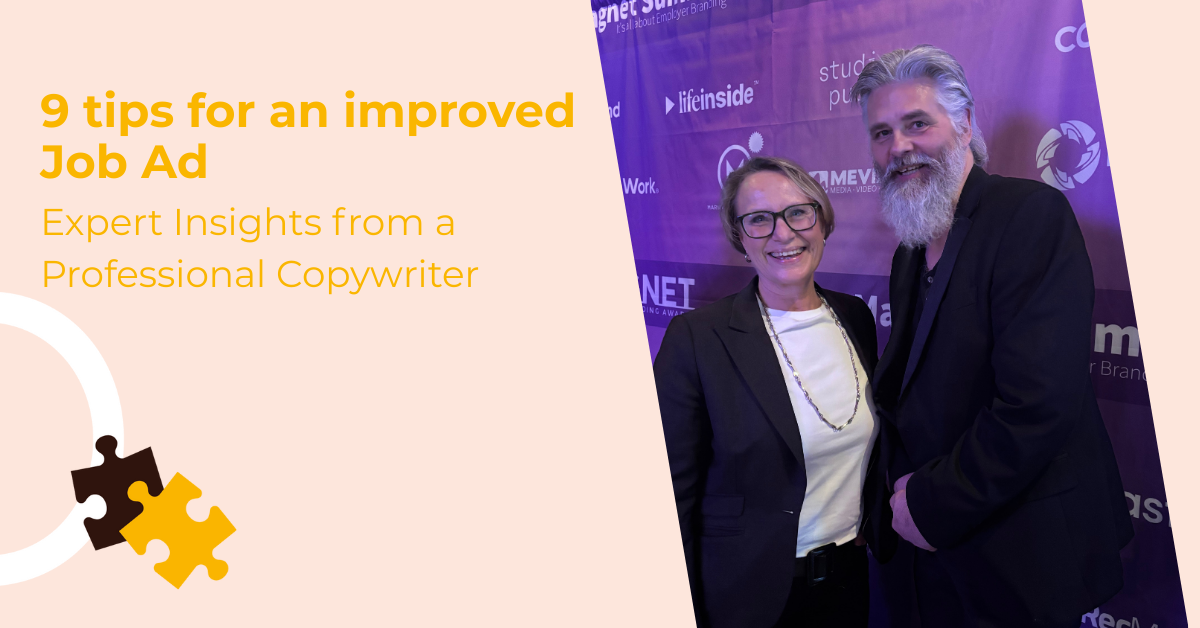An important part of the recruitment process is the job ad. In this blog, we speak to a professional copywriter and expert within employer branding, Rickard Klintlin, who is sharing some expert tips on how to craft a job ad - and what you need to consider, especially now that AI plays a huge part in everyone's work today.
A job ad or placement ad is often our first contact with potential new employees – and YOU know that you have an interesting and exciting job to offer, but you also need to spread the word and tell more about it.
The headline must be searchable
Most people who are looking for a job today Google for it. Usually, they combine a title with a location. So, make the headline clear for the reader and for search engines. In other words, the headline must contain the title and the location. If you can add a personal trait that is important for the role, that’s naturally beneficial. Here are a few examples:
- Focused Project Manager to ’Company’ in Amsterdam.
- Accurate Administrator, ’Company’ in Brussels.
- Creative and down-to-earth UX Designer, ‘Company’, London
Write a preamble that sells the job
"You need to answer the question: Why apply with you?"
A simple and easy way to attract the reader is to ask a question, such as: "Would you like to become a part of a dynamic development team that thrives on innovation? Can you see yourself working with one of the largest suppliers/developers/producers of…?"
Additionally, consider using inclusive language to attract a diverse range of candidates. For example, words like "collaborative," "supportive," and "innovative" can appeal to a broad audience and promote a welcoming environment.
Do not overdo the number of questions you ask because the reader will lose interest in the text. No more than three questions, because, in one way or another, you need to answer them somewhere in the preamble. Either directly after the question or as a finishing of the preamble.
So, ask yourself why anyone should apply for this position. What makes it attractive and interesting?
Describe the role and the department/team
Describe the role as fully as you can, but do not make it a list of requirements. And try to avoid being too lengthy. Put yourself in the candidate’s shoes; What can make them apply? Which information do they want about the role?
Start with what’s most important and focus on tasks and responsibility areas. What could a day look like for this person/role? Will the person need to travel for work? How far and how often? Weave in personal traits connected to this job, teamwork and other role-related information.
When the candidate has read your ad, s/he should be able to answer the following questions:
- Which are the primary work tasks?
- What will I be doing mostly?
- What will a normal day be?
- Is there any challenge for me in the work?
- Which people and/or departments will I be in touch with or cooperate with? (Do not use names of future colleagues but functions/ roles.)
"Remember, to not make it a novel!"
- Stand out by telling good stories
Avoid clichés if you can, such as:
- Multitasking
- Stable
- Open atmosphere
Instead of clichés, try to describe what makes your workplace unique:
- ‘We know everyone by their first name’
- ‘The intern comes up with great ideas as often as the manager’
That said, there may be occasions where a cliché can be used. You want to phrase it something like, ‘We know it’s a cliché, but we truly have an open atmosphere here.’
If you want, you may add a quote from a leader or colleague.
‘One can almost touch the great start-up feel here! Ideas are tested constantly and instantly, says (first name of future colleague), who has been with us for xx years.’
Perhaps the good stories are hidden in your everyday life. Is there anything that defines you? Such as:
- Do you celebrate successes? How?
- Are there any annual events? Christmas party, summer party, excursions, picnics, bowling…?
- Do you do anything in particular during breaks? Shoot pool, play table tennis, throw darts…?
- Do you have any associations within the company? Football, programming, darts, computer games, hiking, art…?
Try to find what sets you apart from the competition and incorporate it into the text.
In lack of inspiration? Ask your colleagues!
You can renew your inspiration by inviting your colleagues to be part of the process. Ask them about their everyday, why they like working in the team/ department. It’s also an opportunity to pick up quotes – but remember to check with whoever said it that it’s ok to use it.
Have at least one colleague read the ad before you publish it and ask for feedback. Do not take the feedback as criticism, but for what it is: suggestions to make the ad even better. Also, ask if it catches your interest enough to apply for the role. Would they apply?
Be concrete and use plain language
Avoid pompous phrasings that don’t add anything to the message you want to send, such as:
“You will be responsible for identifying opportunities and obstacles for the project, of veritable protean character.”
Any such phrasing will raise more questions than answers.
Instead, be as concrete as possible:
“As Project Manager, you will run both larger projects and parts of projects within the construction and energy industries. You will be part of a team of x people where you can give and take feedback and brainstorm together.”
At times, there is a need to use certain specific industry terminology, simply to signal that ‘we know what we’re talking about’ to those in the know. However, it is equally important to show confidence by talking about what we do in simpler terms. Having the courage to talk about difficult things in as a simple way as possible, as well as using well-chosen industry words, signals that we know what we are talking about, or rephrase ‘we can talk about it this simple way, because we are experts.
Make the text easy to glance through by using clear subheadings
This will make it easier for the reader to quickly know where what kind of information is placed. Try to stick to set subheadings because, after a while, this will make your ads recognizable to the reader. Start by sorting the information under each subheadline. Rephrase it to make it readable and ‘sound’ like you. If you use bullets, do not overdo them and remember to mix bullets and body copy.
Consider what tense you need to write in
Concerning work tasks and other role-related information, this is something the candidate doesn’t ‘have’. It is something that a person ‘will get’. So use a future tense and phrasings such as ‘will have’, ‘will get’, ‘it will be you who’, you will be and so on.
When it comes to formal requirements, such as education, training and experience, as well as personal traits, this is something the person must carry with them into the role. This is why we use the present tense in this part of the ad. Phrases like ‘you are’, ‘you have’, ‘you know how to’, and so on are examples of phrases to be used. This is also true for desired knowledge or experience. Examples: ‘it is desirable if you have/ know’, ‘if you know xx, this will be advantageous/ a plus and so on.
Integrating AI in Recruitment
AI is transforming recruitment by offering efficiency and precision. To ensure AI complements your efforts, consider these points:
- Use AI for data insights to refine job ads.
- Keep a personal tone; human oversight is key.
- Optimize keywords with AI for better searchability.
- Regularly check AI for bias to promote diversity.
- Stay updated on AI advancements to adapt strategies.
We also recommend reading our blog on How AI is Transforming is transforming the hiring process. And the blog of AI for you as a job seeker.
Above all – be honest!
You will be more successful if you are honest and down-to-earth in your ad. Always provide a truthful view of the candidate’s possible future every day. This way, you will set the expectations at a realistic and correct level. If you promise too much and raise expectations, there’s a significant risk that the candidate will be disappointed once they are in the door – and leave as soon as s/he can. If you create the opposite, too low expectations, you run the risk of hardly getting any applications or only from people that aren’t qualified for the position.
Good luck!
Thank you to Rickard Klintlin, Senior Copywriter & Employer Brand Lead,
Did you get inspired by this post and wish to know more about how you can use storytelling to increase your Employer Branding? Do not hesitate to reach out to Rickard at Business & People !


